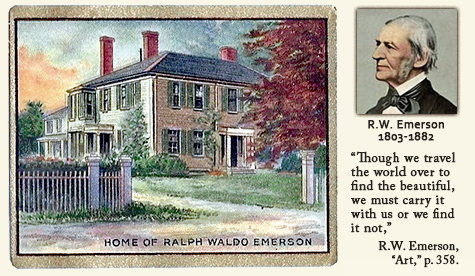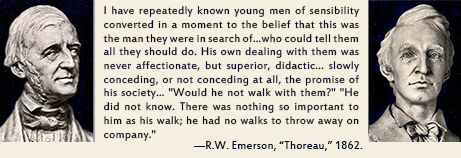
Explore resources on Emerson and his family at the Concord Free Public Library. Read Thoreau's reflections on Friendship, Love, and Marriage on the Internet Archive. Read Emerson's essay on Friendship on the Internet Archive. Browse quotes from Thoreau, Emerson, and others on the Internet Archive. Thoreau spent the summer of 1837 living with Stearns Wheeler in a shanty on Flint's Pond. Ellery Channing, who believed that this experience inspired Thoreau's experiment at Walden, described Wheeler as a man whom Thoreau "almost worshiped." |
Emerson HouseIn 1835, after his marriage to Lydia Jackson, whom he called "Lidian," Ralph Waldo Emerson moved from the Old Manse, his family home, to his own house on Concord Turnpike. Known as "Coolidge Castle" after its former owner, but renamed "Bush" by its new inhabitants, the house attracted streams of visitors as Emerson's writings and lectures earned him international fame as "the sage of Concord." Exactly when Thoreau and Emerson first met remains uncertain, but the two had begun to develop a deep bond by 1838. "My good Henry Thoreau," Emerson recorded in his Journal in February that year, "made this else solitary afternoon sunny with his simplicity and clear perception...Everything that boy says makes merry with society, though nothing can be graver than his meaning." From that time until Thoreau's death in 1862, Emerson assisted his friend in countless ways, including inviting him to live in his house to serve as handyman, gardener, and literary protegé, first from 1841 until 1844, then again from 1847 to 1848. Emerson also introduced him to publishers, editors, and a long train of literary figures, both in person when they visited his home and in his extensive correspondence. In 1841, for instance, he mentioned in a note to Thomas Carlyle, "One reader and friend of yours dwells now in my house. Henry Thoreau, a poet whom you may one day be proud of—a noble, manly youth, full of melodies and inventions. We work together day by day in my garden, and I grow well and strong." Over time, their friendship faltered, perhaps, the speculation goes, because Thoreau grew uncomfortably close to Lidian Emerson while her husband was off lecturing in Europe. Alternatively, the friction may have developed after Thoreau's first book, A Week on the Concord and Merrimack Rivers (1849), failed to sell, and both men began to doubt if the younger writer's literary ambitions would ever be fulfilled. In any case, neither seems to have been especially disposed to sustaining emotional bonds, and both were wounded by profound loss that may have inclined them to step back from close attachments. Emerson's first wife, Ellen Tucker Emerson, died in 1831, seventeen months after their marriage. In 1842, Waldo Emerson, Lidian and Ralph's five-year-old son, suddenly succumbed to scarlet fever. That same year, Thoreau was rocked by the death of his older brother, John Thoreau, who contracted lockjaw after nicking himself with a razor. A Week, which Thoreau drafted while he was living at Walden, includes a discursion on friendship that not only foreshadows his growing bitterness about his estrangement from intimates such as Emerson, but also explains why he generally ended up feeling betrayed or disappointed. No one, it seemed, could rise to his expectations or meet what he described as his "infinite demand": "If I can see my Friend's virtues more distinctly than another's, his faults too are made more conspicuous by contrast. We have not so good a right to hate any as our Friend. Faults are not the less faults because they are invariably balanced by corresponding virtues, and for a fault there is no excuse...I have never known one who could bear criticism, who could not be flattered, who would not bribe his judge, or was content that the truth should be loved always better than himself, " Wednesday, A Week on the Concord and Merrimack Rivers. For his part, Emerson sometimes confided his frustration with Thoreau in his journal, complaining, for instance, in 1851: "Henry does not feel himself except in opposition. He wants a fallacy to expose, a blunder to pillory, requires a little sense of victory, a roll of the drums, to call his powers into full exercise." He included some of these critical comments, along with high praise, in the eulogy he gave at Thoreau's funeral. "I love Henry," he famously said, quoting fellow Concordian Elizabeth Hoar, "but I cannot like him; and as for taking his arm, I should as soon think of taking the arm of an elm-tree." Although Emerson's eulogy and other remembrances paint Thoreau as a cold fish, Daniel Ricketson, who sought him out after delighting in Walden, and Thomas Wentworth Higginson, who counted a Week among his favorite books, found these opinions misguided. According to Ricketson, Thoreau "won rather the respect and admiration of his friends than their love. He was so superior to almost all other men that he inspired a certain amount of awe." Higginson, who likewise felt that Thoreau had been misunderstood, wrote that his detractors failed to see "how much of the sunshine at that period came also to many from Thoreau himself, whose talk and letters, like his books, were full of delicate humor." These tributes belie the popular view of Thoreau as a dour misanthrope, but his conflicts with Emerson seem to have arisen from a more general inability to forge deep and lasting attachments. It is, in fact, odd that his thoughts on friendship have been collected into stand-alone volumes given his unhappy comments in response not only to his waning bond with Emerson, but also to his increasing sense that he was, if not fated, then at least more suited to spending most of his life alone. Thoreau's tortured remarks on friendship have long invited questions about his sexual orientation. In the absence of overt declarations, however, it seems impossible to draw reliable conclusions about his feelings for other men, just as we cannot go beyond what we know to define the nature of his attachment to Lidian Emerson (or any other woman). His sister Sophia Thoreau's claim that he made a deathbed confession of his lifelong love of Ellen Sewall, who had rejected his proposal of marriage in 1840, seems a bit suspect, especially in relation to her efforts to avoid public discussion of her brother's admiration for Walt Whitman, whom she, as did Lidian Emerson and Abba Alcott, refused to allow in her house in 1860. But if the limits of our knowledge prevent us from penetrating Thoreau's psyche, we can still join him in wondering why he felt mystified by ordinary ideas about sexual attraction and uncomfortable with the categories of heterosexual love: I love man with the same distinction as I love woman—as if my friend were of some third sex—some other or stranger and still my friend...What the difference is between man and woman is that they should be so attracted to one another I never saw adequately stated...Man and man are more nearly of the same sex...What an infinite and divine demand is made on us forever to sustain this relation worthily," Journal, May 5, 1846. |













